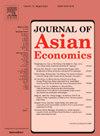Linguistic distance and entrepreneurship of migrants: Evidence from China
IF 3.4
3区 经济学
Q1 ECONOMICS
引用次数: 0
Abstract
This study examines how the linguistic distance between migrants’ cities of origin and destination affects their entrepreneurial activities. Utilizing data from the China Migrant Dynamic Survey in 2017, we find that the likelihood of migrants’ entrepreneurial activities in destination cities initially increases with linguistic distance and then declines. This inverted U-shaped relationship emerges from two opposing effects. A modest linguistic difference helps migrants identify business opportunities. We show that migrants from regions with distinct culinary traditions are more likely to start a business in the catering industry to meet the demand for their home cuisine. A longer linguistic difference also introduces difficulties for migrants in adapting to social norms and creates barriers to build social ties and trust. Our findings suggest that promoting a moderate cultural diversity in a region may help stimulate entrepreneurial vitality. (JEL: J15; J61)
语言距离与移民创业:来自中国的证据
本研究考察了移民的原籍城市和目的地城市之间的语言距离如何影响他们的创业活动。利用2017年中国流动人口动态调查数据,我们发现流动人口在目的地城市的创业活动可能性随着语言距离的增加而先增加后下降。这种倒u型关系来自两种相反的影响。适度的语言差异有助于移民识别商业机会。我们发现,来自具有独特烹饪传统地区的移民更有可能在餐饮业创业,以满足对家乡美食的需求。长期的语言差异也给移民带来了适应社会规范的困难,并为建立社会联系和信任制造了障碍。我们的研究结果表明,促进一个地区适度的文化多样性可能有助于激发创业活力。(jel: j15; j61)
本文章由计算机程序翻译,如有差异,请以英文原文为准。
求助全文
约1分钟内获得全文
求助全文
来源期刊

Journal of Asian Economics
ECONOMICS-
CiteScore
4.70
自引率
9.40%
发文量
90
期刊介绍:
The Journal of Asian Economics provides a forum for publication of increasingly growing research in Asian economic studies and a unique forum for continental Asian economic studies with focus on (i) special studies in adaptive innovation paradigms in Asian economic regimes, (ii) studies relative to unique dimensions of Asian economic development paradigm, as they are investigated by researchers, (iii) comparative studies of development paradigms in other developing continents, Latin America and Africa, (iv) the emerging new pattern of comparative advantages between Asian countries and the United States and North America.
 求助内容:
求助内容: 应助结果提醒方式:
应助结果提醒方式:


